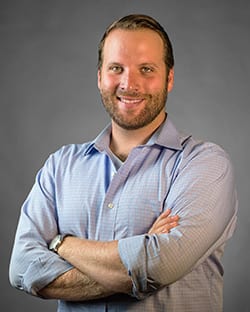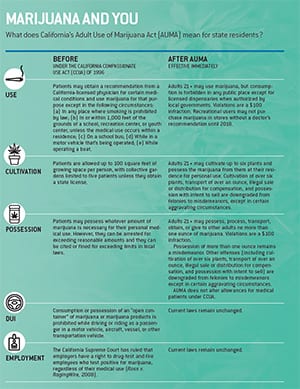
Berkeley Law alumni, faculty, and clinics light the way for a burgeoning area of legal work related to marijuana.
By Rachel DeLetto
From progressive political movements to technological innovations to environmental benchmarks, California has long been a bellwether for national trends. In 1996, it became the first state to permit marijuana for medical use. Since then, 28 other states have adopted medical marijuana, and seven other states and the District of Columbia have legalized recreational use.
No, California was not the first state to legalize recreational use. But when voters passed Proposition 64, the Adult Use of Marijuana Act (AUMA) in November, the state again went beyond what its counterparts have done.
The act lays out a framework for a robust new area of business with the potential to create hundreds of thousands of jobs—including high demand for cannabis lawyers—and billions in revenue. Uniquely, it also includes provisions to remedy past harms of the war on drugs and those worst affected by its impact.
As an institution dedicated to public service and legal innovation, Berkeley Law has many graduates, faculty members, and clinics at the forefront of navigating the legal thicket of this new state law— one whose effects could ripple through other states and perhaps federal law.
In 2015, California took in nearly $58 million in sales tax revenue from medical marijuana dispensaries across the state. Under AUMA, starting in January 2018, recreational marijuana sales will be taxed 15 percent and growers will pay a harvesting tax. The California Legislative Analyst’s Office estimates net state and local tax revenues could eventually exceed $1 billion annually.
Building a new avenue of industry where none existed is difficult, especially when the federal government still classifies the product as a Schedule I drug not recognized to have any medical use under the Controlled Substance Act (CSA) (see Can Sessions Squash Legalization?, right, on the federalism issues involved).
“There are so many legal areas that cannabis touches on: criminal law, regulatory issues, business law, trademark and other IP work, labor issues, bankruptcy, tax,” says Ryan Shaening Pokrasso ’13, who co-founded SPZ Legal with classmate Hash Zahed ’13.
With so many challenges to maneuver, specialized cannabis lawyers are in high demand. And for lawyers trained to rely on precedent, it presents an unusual and exciting opportunity.
Noting the absence of any treatise or casebook to consult, Shaening Pokrasso—who represents a range of cannabis businesses, including cultivators—relies on the cannabis law community in California and other states where it is legal for guidance.

“You have to be bold in doing this type of work,” Shaening Pokrasso says. “You have to just read the law and interpret it the best you can for your client’s situation. It’s fascinating work, especially with the personalities involved.”
That challenge of a relatively blank slate is what drives Jay Purcell ’11. “With marijuana law, this is the ground floor,” he says. “The rules are not written. We can become the most expert people in the country in this practice area, and help shape policy in a way that’s responsible and serves the community well.”
Purcell sees how “this industry is growing by leaps and bounds. It’s huge, totally bananas.” An associate attorney at Rogoway Law Group and a member of the Boalt Hall Alumni Association board, Purcell had no experience with cannabis clients while a corporate and small-business lawyer. But as cannabis entrepreneurs began seeking advice relating to legalization, he joined Rogaway to help build a new practice.
“We have clients that have a long history of operating in the unregulated cannabis space in various ways,” Purcell says. “Suddenly, we have to figure out how to move these undocumented businesses into an elaborate new regime quickly.”
CULTIVATING LAW AND POLICY
AUMA establishes 19 types of state licenses, which all cannabis businesses will have to acquire. These cover cultivation, manufacturing, testing, distribution, and retail. Additionally, localities are empowered to license and regulate commercial marijuana businesses, and they have the latitude to ban recreational businesses entirely. In addition to advising clients on the many issues that arise in licensing, cannabis attorneys do a big part of their work in local advocacy.

Ariel Clark ’05, a founding partner at Clark Neubert LLP (aka, Lawyers for the Green Frontier) in Los Angeles and San Francisco, has practiced in the marijuana space for more than a decade and co-founded the Los Angeles Cannabis Task Force. The organization works with the city to develop a transparent process that allows cannabis businesses, neighborhood groups, scientists, and other community members to participate in creating rules and permits.
“Advocacy goes hand-in-hand with practicing cannabis law. This industry can’t thrive without market clarity, so a big part of my work is taking clients’ needs to regulators and speaking up on their behalf,” Clark says. “I’m here to make sure my clients follow the law—but also to ensure the laws themselves are fair.”
It all depends on the regulations adopted by individual municipalities. That’s why Clark spends significant time meeting with cannabis stakeholders and regulators, to ensure that the laws relating to marijuana businesses ultimately adopted by Los Angeles fairly represent the interests of her clients, especially in the area of diversity.
To create racial, gender, and socioeconomic diversity within the industry, Clark cites Oakland as a template. The city council is considering an “equity permit” program, which would reserve some of Oakland’s cannabis business licenses for people with past marijuana-related convictions and residents in areas with high numbers of marijuana arrests.
Like Clark, Purcell and Shaening Pokrasso say policy work makes up a fundamental part of their practice. They agree that community participation and advocacy will play a huge role in shaping the future of California’s cannabis industry.
“Different counties are approaching recreational marijuana businesses in very different ways,” says Purcell. “That’s because someone went to a town council meeting, stood up, made a fuss, and participated in the rulemaking process.” Purcell and Clark encourage those who care about this issue, on either side, to make their voices heard.
“It’s not often that we get to be part of an emerging industry,” says Clark, noting that California citizens can help establish a value system for an important cash crop for the state. To ensure that the new regulations benefit everyone, she says, “it’s incredibly important for people to be engaged and for cannabis businesses to get organized.”
LEARNING FROM THE WAR ON DRUGS
Beyond the major business opportunities created by recreational legalization, AUMA seeks to remedy decades of often discriminatory enforcement of criminal laws relating to marijuana.

“Prop. 64 goes much further than any other state in terms of social justice reform,” says Joy Haviland ’08, a staff attorney on the Marijuana Law and Policy team at Drug Policy Alliance (DPA). Haviland and her DPA colleague Jolene Forman ’12 were among the advocates representing interest groups at the Prop. 64 drafting table.
“The way we see the war on drugs, and specifically marijuana prohibition, it’s really a war on people of color,” Haviland says. “Blacks and Latinos are arrested at significantly higher rates than white people for possessing or selling drugs, even though studies show they use and sell drugs at the same rate.”
Before joining DPA, Haviland worked at the Bronx Public Defenders’ office in New York City and saw how the longterm consequences of marijuana convictions can be severe for young people and non-citizens.
She and Forman pushed for reform within Prop. 64 to address these issues—and succeeded. The version adopted by voters includes what Forman calls “gold-standard provisions,” such as:
- Record-clearing and retroactive sentencing reductions for people previously convicted of offenses that would not be a crime, or would be a lesser offense, under AUMA’s revised penalty structure.
- Ensuring that youth offenders are no longer liable for criminal punishment for marijuana-related offenses; instead, they are subject to drug education and community service.
- Prohibiting the denial of business licenses based solely on previous marijuana convictions.
- Lowering financial barriers to enter the business, including micro-licenses, so people without significant wealth and resources can join the market.

In addition, $10 million of marijuana sales taxes will go to California public universities to study and help implement AUMA, and $10 million per year will go to community reinvestment programs starting in 2018 (increasing by $10 million annually to a cap of $50 million). These encompass grants to nonprofits, re-entry services, job placement, mental health and substance abuse treatment, legal services,
and other services to communities disproportionately affected by the war on drugs.
CLEANING THE SLATE
While the new licensing structure for recreational sale of marijuana does not take effect until January, the decriminalization of use and possession (see Marijuana And You graphic, page 41) and criminal penalty restructuring provisions are effective immediately. The East Bay Community Law Center’s Clean Slate Clinic is one of the organizations helping to clear and reclassify marijuana convictions from the records of thousands of Californians.
“Low-level drug offenses can prevent people from getting jobs and occupational licenses and increase the risk of future incarceration,” says Sarah Crowley, the clinic’s director. She believes AUMA’s sentence reduction and record-sealing provisions can be game-changers for her team’s clients, many of whom have served time and are now trying to reintegrate into society.
“One of the great things about AUMA is that it puts the burden on the prosecutor to show why a petitioner isn’t eligible for relief under the redesignation provisions,” Crowley says. She hopes this will make Prop. 64 relief much easier to adjudicate, even if a petitioner cannot afford representation.
In addition to assisting clients with petitions, Berkeley Law students in the clinic will host educational sessions in the community. They will also conduct other outreach to publicize the remedies available under AUMA and make sure people know their rights and how to file petitions for relief.
SHIFT IN PUBLIC OPINION
Berkeley Law Professor Franklin Zimring is a leading scholar on criminal justice reform and co-author of Criminal Law and the Regulation of Vice, one of the first legal textbooks to analyze alternative drug policies and their impact. To his eye, AUMA’s unprecedented and progressive penalty structure comes from a drastic change in public opinion.

“Medical marijuana was a fascinating struggle. But once it was in place, people started realizing marijuana isn’t terrible,” Zimring says. “It’s not hairy beasts with loud guitars smoking dope, it’s little old ladies with cancer and gay men with AIDS trying to reduce pain.”
Opponents of AUMA worry that legalizing marijuana will increase crime. Zimring says this is an unfounded concern. “We’re in a period of adjustment to decriminalization,” he notes. “So far, nothing bad has happened. And based on recent reports looking at long-term trends there don’t appear to be extreme effects either way.”
Despite significant science to the contrary, the federal government continues to classify marijuana as Schedule I—which covers drugs, substances, or chemicals with no currently accepted medical use and a high potential for abuse. Included in that category: heroin, LSD, ecstasy, methaqualone, and peyote.
The fact that marijuana remains a Schedule I drug “probably meets the legal definition of obscenity,” Zimring said during a March event at Berkeley Law on marijuana policy. Many lawmakers agree. In March, Democratic members of Congress introduced legislation to remove cannabis from the CSA, which would enable each state to tax and regulate it like alcohol or tobacco.
Zimring suggests that regulating marijuana in a similar way to alcohol makes sense in many respects. However, a key concern—the expected increase of accidents, arrests, and convictions related to driving under the influence of marijuana following legalization—may not be so simply solved. According to Professor Andrea Roth, states face a challenging task in setting standards for regulating such driving (see The Trouble with DUI Marijuana, page 43).
RIPE FOR INNOVATION
Unless and until marijuana is removed from Schedule I designation, assisting in the sale of cannabis products is illegal under dozens of federal laws, and efforts to build legitimate cannabis businesses face many legal obstacles.
The Obama Department of Justice memorandum (see Sessions, page 38) lessened the risk of federal raids for distributors and cultivators. But the federal illegality of marijuana also creates complications for entrepreneurs and their attorneys with regard to banking, insurance, taxes, intellectual property, brand protection, and even legal ethics.
Under the CSA, it is illegal to aid and abet the manufacture, distribution, or dispensing of marijuana. Therefore, banks would violate various federal laws by accepting deposits from the sale of marijuana, processing credit card payments for purchasing it, or providing a loan for a cannabis business.
This creates a serious conundrum. “Federally chartered banks will shut down your account if they find out the business is cannabis-related,” Purcell says. State-chartered banks are slightly more lenient but still subject to many of the same federal rules. Unable to deposit revenue into secured accounts, many marijuana business owners are forced to deal entirely in cash.
“Completely legitimate businesses have to take bags full of cash to pay their taxes,” says Shaening Pokrasso. “It’s a huge security risk to have that much cash on premises.”
Many of Purcell’s clients rely on management companies as intermediaries to handle finances, taxes, and payroll. But this is also risky as management companies—like lawyers—could be subject to the CSA’s aiding-and-abetting provisions.
“There are literally billions of dollars that need a home. It’s an area ripe for innovation,” says Shaening Pokrasso.
According to Shaening Pokrasso, who represents a few marijuana tech companies, the startup community is taking notice of this opportunity. Companies such as Kind Financial provide record-keeping services to ease the complex task of closely monitoring marijuana businesses’ cashonly transactions. Another young startup, Tokken, aims to offer an electronic payment system that will not rely on credit card companies or bank debit networks, but instead the Bitcoin blockchain, similar to Venmo.
But solutions are still a ways off, and with the uncertainty of a new administration, cannabis lawyers must make sure their clients understand how to strictly follow California’s laws. Berkeley Law is also taking steps to prepare future attorneys in the field by offering the course Marijuana Law & Policy this fall. Tamar Todd, senior director of DPA’s Office of Legal Affairs, will teach it.
Prop. 64 opened an enormous window of opportunity for cannabis-industry jobs and businesses. Nevertheless, Purcell advises enthusiastic clients to be cautious.
“Don’t be the gazelle that runs ahead,” he says. “The next few years, just focus on coloring in the lines and being totally compliant with state law. It’s probably going to become safer every day, but right now, we don’t know what this administration will do.”



